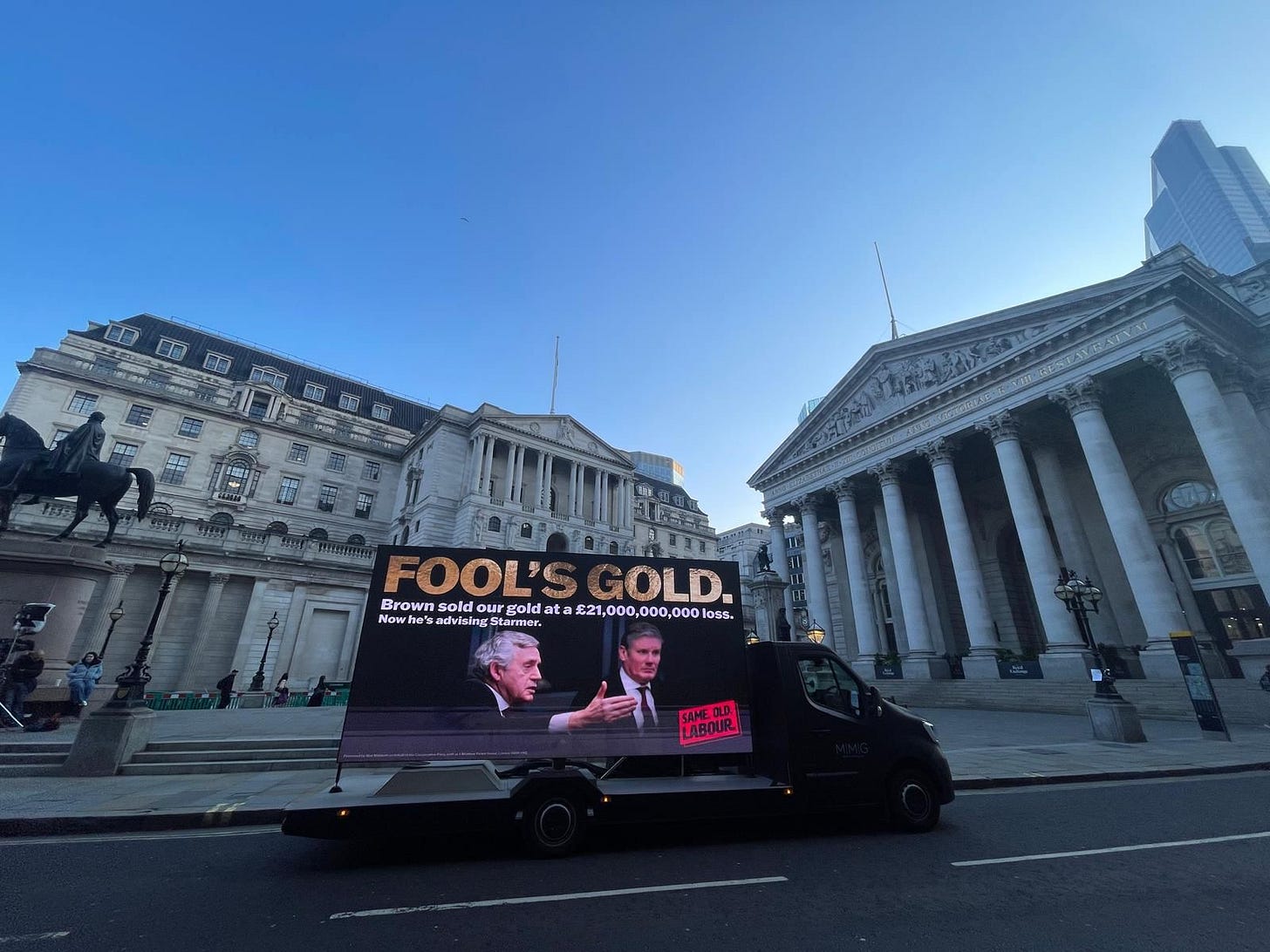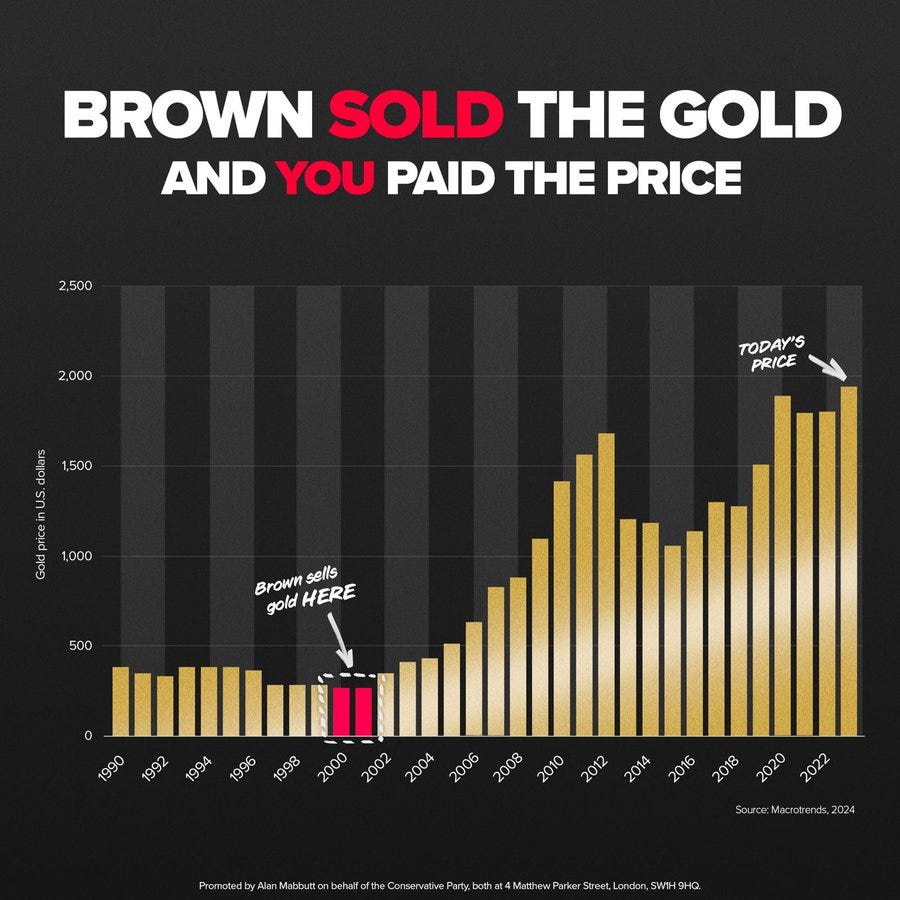Old gold
'Oo 'members Gordon Brown? What were that all about, eh?
One of the worst things about getting old is getting old. I work in an office where some of the younger staff were born in the 21st century, which is absurd. A recent discussion of some of my colleagues’ formative memories yielded the terrifying fact that the first political events they can remember noticing were Barack Obama’s (second!) presidential election victory, or the formation of the Cameron-Clegg coalition, or (for slightly older ones) the financial crisis or the anti-Iraq war marches. As someone whose first political memories are of the miners’ strike, this is all very disconcerting.1
It is very easy to forget that some things that seem recent to you are not recent at all, and that lots of people don’t remember important events from your lifetime that made a big impression on you at the time, not because they weren’t paying attention but because they just hadn’t even been born yet.
Anyway. Two facts. One: the crossover age at which people are more likely to vote Conservative than Labour is now 70, having been 39 at the 2019 election. Two: yesterday, the Conservative Party hired an ad van. Here’s the press release:
This week marks the 25th anniversary of Gordon Brown’s decision to start selling off the country’s gold. To mark the anniversary of this infamous decision, the Conservative Party sent an ad van to Labour HQ via the Bank of England showing the true cost of Gordon Brown and Labour’s decision.
The ad van will reveal new Conservative Party analysis which shows Gordon Brown’s decision to sell off Britain’s gold reserves made a loss of £21 billion.
Despite the Bank of England objecting to the sale of the gold at the time Brown, assisted by his adviser and now Labour Shadow Energy Secretary Ed Miliband, sold off the country’s gold reserves when the gold market was at its lowest in 20 years. The price of gold at the first auction was $261.30 compared with a spot price today of $2,316.64.
Gordon Brown is still advising Sir Keir Starmer and Rachel Reeves. Reeves described Gordon Brown as her ‘mentor’.
Bim Afolami, Economic Secretary to the Treasury, said:
“Twenty-five years on, the British people are still paying the price for Gordon Brown’s poor mismanagement of our economy.
“The Labour leader may have changed but there’s nothing new about them, just like last time they would take us back to square one with higher taxes, higher unemployment and a plot to betray pensioners.”2
It is difficult to imagine any news organisation looking at this press release and sending a photographer, or indeed doing anything other than sighing heavily, but the Conservative Party sent out some not very interesting official photos of the ad van outside the Bank of England. Here’s one:
I have not found any evidence that anyone has printed this photo anywhere,3 because, well, look at it. The Tories also tweeted two graphics on the same theme, both with the same caption:
Brown sold the gold. He raided pensions. Then left a note confirming ‘there is no money’.4
Now he’s helping Keir Starmer do it all over again.
#SameOldLabour🥀
You’d have thought that a big part of the reason selling off the gold was bad, if it was bad, is that it’s been sold and that we haven’t got it any more. Given that, I’d be sceptical that Keir Starmer is going to “do it all over again”, unless he buys it back first. But here are the graphics:
and:
I may be old but I am not 70, so I am more likely to vote Labour than Conservative at the next election. But I do remember Gordon Brown selling the gold, and I remember this being a big deal at the time. Specifically, I remember having a summer job as a student, in a car seat headrest factory,5 and listening to the radio playing over the noise of the machinery, and hearing the DJ talking about Gordon Brown selling the gold and then playing Gordon Is A Moron by Jilted John.6
“Gordon Brown sold the gold” is one of those phrases that did pass into the national consciousness and that many people did and do remember, even if they didn’t and don’t particularly understand what selling the gold might have involved and why it was bad, and regardless of whether the policy was justifiable at the time - it is at least arguable that it was. The Conservatives have used the attack before, such as in this poster from the 2010 election campaign:
In defence of the Conservatives’ 2010 election campaign, Gordon Brown was their actual opponent. But the world has changed since then, and running a mini-campaign focused on Brown - especially one whose entire hook is “this was 25 years ago” - is a bit weird. The fact that Brown has advised Keir Starmer, that Ed Miliband used to work as Brown’s adviser and that Rachel Reeves has praised him are all fairly underwhelming, as facts go. And it is quite hard to run “Starmer loves Brown” alongside the Conservatives’ previous “Starmer loves Corbyn” message, although it does have the advantage of being less obviously nonsense.
The bigger problem with this is that it looks desperate. The Conservatives have just been crushed in the local elections. They are 30 points behind in the latest YouGov poll. All the indications are that the settled will of the British people is that they should just go. And the best they can come up with this week is an attack on the sixth most recent Prime Minister.
Gordon Brown is not ancient history. But if you want to point to a previous Prime Minister and warn voters that you can’t trust the people who put them in charge, he is a damn sight more ancient than Liz Truss.
Gordon Brown sold the gold in 1999. Unlike some of my colleagues, I am old enough to have lived through two notable events that happened after 1999: the 2001 general election and the 2005 general election, both of which, as I remember, Labour won.7 Selling the gold might have been a bit unpopular, but it wasn’t unpopular enough to stop Labour winning two subsequent elections, or to stop Gordon Brown being Chancellor and then Prime Minister for another 11 years. If it couldn’t do that, it isn’t going to stop Keir Starmer.
Last week I posted the latest in my ongoing-and-unlikely-to-end-any-time-soon series of posts about the (in my opinion) strategic disaster that is the Conservatives’ commitment to abolish National Insurance. This included a response to John Rentoul’s complaint that Labour’s attack on the policy as a £46 billion unfunded spending commitment is “low politics” and “cynical and wrong”. John has now responded, and you can read his response here. I am not convinced, but it is better to be disagreed with than ignored. As I say, I expect this to be a topic this Substack returns to, because I expect the attack to run and run.
The first news event of any kind that I can remember is the raising of the Mary Rose in 1982. Earlier this week we went to the Mary Rose Museum in Portsmouth, where the remains of the ship are on display along with many of the thousands of artefacts recovered from the wreck, and I can’t recommend it highly enough: it is one of the best museums I’ve ever visited.
This is a bad press release on a number of levels but I think my favourite bit is “poor mismanagement”. Also, the subject line is “Conservative Party Press Notice: Brown Sold the Gold”, which is just funny.
Except here.
Factcheck: Gordon Brown did not leave a note confirming “there is no money”, and nobody thinks he did. Liam Byrne’s note has been correctly attributed to Liam Byrne for the last decade and a half of Conservative campaigning, and it’s a bit odd that they think they can get away with pretending someone else wrote it.
Until I got a summer job in a car seat headrest factory it had never really occurred to me that there are car seat headrest factories. It was not a particularly exciting job: my task was to thread a metal loop into a fabric seat cover and then put it on a shelf, and after I had been doing this for two minutes I was exactly as good at it, and exactly as bad at it, as anyone who had ever done it. I was, however, paid the minimum wage, thanks to Gordon Brown.
My other student job musical memory is from when I worked in a jobcentre where they played an 80s compilation tape on a loop, which meant that every hour or so the unemployed people of Leeds queued to sign on to the accompaniment of Ghost Town by The Specials. This story is so on the nose that it ought to be a lie, but it isn’t.
I am fairly sure that all of them lived through the 2005 election, but I’m less sure than I’d like to be.






“As someone whose first political memories are of the miners’ strike..”
Even older readers think: which one?
If you feel old in our office, think how old I feel! Brown got the market price for the gold. As Thatcher said, you can't buck the market. If the price rise had been predictable, hedge funds etc would have bought it and the price would already have risen. Politically it was silly - because there was a 50:50 chance the price would rise, so selling gives your opponent a 50:50 chance of an easy hit.